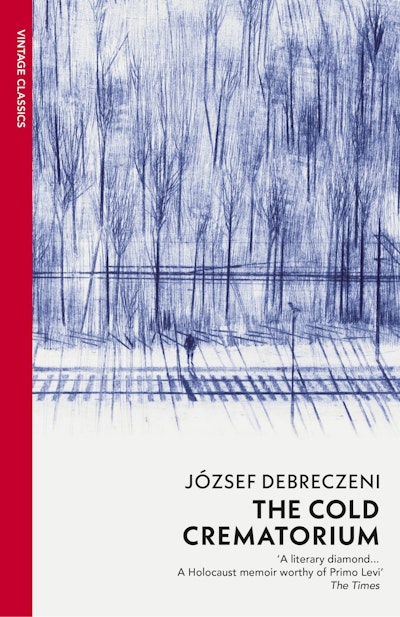- Published: 23 April 2025
- ISBN: 9781784878887
- Imprint: Vintage Classics
- Format: Paperback
- Pages: 256
- RRP: $22.99
Cold Crematorium
Reporting from the Land of Auschwitz
- Published: 23 April 2025
- ISBN: 9781784878887
- Imprint: Vintage Classics
- Format: Paperback
- Pages: 256
- RRP: $22.99
An indispensable work of literature and a historical document of unsurpassed importance. It should be required reading
Jonathan Safran Foer, author of EVERYTHING IS ILLUMINATED
József Debreczeni was a journalist and a poet and he brings the skills of both to this remarkable work. Cold Crematorium will awe you with the acuity of its observations and the precision and beauty of its language. It should be read by everyone wishing to understand the cruelty and barbarism of the Shoah, but also the indomitable spirit of its survivors
Ehud Barak, Former Prime Minister of Israel
An immensely powerful and deeply humane eyewitness account of the horror of the camps. Through vivid descriptions of what he saw and experienced there, Debreczeni confronts the reader with the hell that the Holocaust was; not as something general belonging to history, but as a particular, concrete and devastating reality
Karl Ove Knausgaard, author of MY STRUGGLE
A timely reminder of man's inhumanity to man, especially for the young generation
Jung Chang, author of WILD SWANS
An extraordinary memoir... An unforgettable testimonial to the terror of the Holocaust and the will to endure
Kirkus, *Starred Review*
Whatever I say about this amazing book feels inadequate. Cold Crematorium is a brilliant book, but the word brilliant does not encompass it. It evades words. I have seldom read a book that creates empathy while dealing with the most dehumanized and dehumanizing experience. I wish everyone would read it, especially in this time of sheer inhumanity and baffling complicity
Azar Nafisi, author of READING LOLITA IN TEHRAN
In the timeliest possible way, it succeeds in restoring the Holocaust’s reality... Debreczeni writes with a cinematic clarity, a determination to make detail triumph over mass dehumanisation
Telegraph
A literary diamond – sharp-edged and crystal clear. A haunting chronicle of rare, unsettling power... A holocaust memoir worthy of Primo Levi
The Times
Cold Crematorium offers a cleareyed view of the Nazi death machine with shades of gallows humor, tragedy and anthropological insight
New York Times
Meticulous and intelligent translation... A masterpiece
New Statesman
Published in Hungarian in 1950 and won him prizes, but has only now been translated, elegantly and precisely, by Paul Olchváry. What is remarkable is that this vivid, painful memoir has remained so long unknown
Literary Review
As immediate a confrontation of the horrors of the camps as I’ve ever encountered. It’s also a subtle if startling meditation on what it is to attempt to confront those horrors with words… Debreczeni has preserved a panoptic depiction of hell, at once personal, communal and atmospheric
New York Times
Astonishing… Debreczeni captures detail after harrowing detail
Guardian
A masterpiece of clinical, mordant observation... Look elsewhere for platitudes — Debreczeni witnessed, and reported, the best and worst of mankind and showed it to us to use as we will
New York Times
An instant classic
Jewish Chronicle, *Books of the Year*



